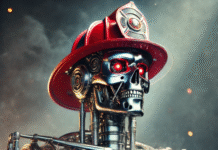Did you know that by 2023, about 90% of top companies will use artificial intelligence (AI) in their work? This shows AI is key in fields like healthcare, finance, and online shopping1. Starting an AI journey is now a must for keeping up in the job world. Knowing how to start AI and find the right education can open doors to new jobs and improve your skills.
This article will guide you through the steps for artificial intelligence learning. You’ll learn the basics of AI and how to use popular learning tools. By the end, you’ll be ready to start your AI learning journey.
Key Takeaways
- The majority of companies now use AI in their operations.
- Starting an AI journey is essential for career advancement.
- Understanding AI applications can enhance business efficiency.
- Continuous learning is important due to the rapid pace of AI development.
- There are many resources available to assist with AI learning.
Understanding Artificial Intelligence
Artificial intelligence, or AI, is when machines, like computers, act like humans. They can do things we think are smart, like recognizing patterns and making choices. This technology is changing many areas of life.
Definition of AI
There are three main types of AI: narrow, general, and super. Narrow AI, or weak AI, includes tools like Siri and Alexa. It also includes chatbots for customer service2. General AI aims to be as smart as humans, but it’s still a dream. Super AI wants to be even smarter than us2.
Applications Across Industries
AI is used in many fields, changing how they work. In healthcare, AI helps predict patient outcomes and diagnose diseases. This makes healthcare better for everyone. In finance, AI spots fraud and helps with trading, showing its power3.
Other areas like e-commerce and transportation also benefit. They get better customer service and smoother traffic flow.
AI does more than just automate tasks. It also creates new ways of doing things. As it keeps getting better, knowing about AI is key for many jobs.
AI is becoming a must-have skill for professionals across various industries, with knowledge improving problem-solving and operational efficiency.
Why Learn Artificial Intelligence Now

AI technology is changing fast, opening up many job opportunities in different fields. The U.S. Bureau of Labor Statistics says AI jobs will grow a lot, with about 97 million new positions expected soon5. Jobs in AI include AI engineers and data scientists, all in high demand because of the need for tech skills today6.
Those who choose AI careers can expect good pay, with AI professionals earning an average of $153,719 a year5. This high salary shows how important AI is for making better decisions and automating tasks in many industries.
Job Opportunities in AI
More and more companies want to use AI in their work. This is because AI helps them work better in fields like healthcare, finance, and e-commerce. Thanks to AI, these industries can see a 64% boost in productivity5.
Learning AI algorithms helps professionals solve tough problems. This makes them valuable and adaptable in a competitive job market6.
The Growth of the AI Field
AI is growing fast, with a 37.3% annual growth rate expected from 2023 to 20305. This growth comes from new tech like machine learning and big data analytics. People with AI skills are not just keeping their jobs; they’re becoming key players in the AI world6.
How do I start AI?
Starting AI needs careful planning and a solid AI learning plan. This plan helps set learning goals and check what you already know. It also guides you to find the right resources and set realistic goals for your AI journey.
Development of a Learning Plan
Creating an AI learning plan involves several paths. You can get a degree, take online courses, or learn on your own. It’s important to focus on basics like math, especially linear algebra and probability, to start well7.
Learning Python, a key AI programming language, is also crucial8. Joining community projects and sites like Kaggle can give you hands-on experience and deepen your knowledge8.
The AI software market is expected to hit $126 billion by 2025. A well-planned learning path can help you grab new job chances in this growing field9. Setting clear goals and deadlines keeps you focused and motivated. An AI learning plan guides you, helps you build important skills, and lets you learn at your own pace.
Prerequisite Skills for Learning AI
For those starting their AI journey, a solid math foundation is key. Knowing basic math helps learners understand complex algorithms. Also, having a grasp of statistics is crucial for analyzing data.
Studies show that 70% of beginners in AI stress the need for a strong math background10. Knowing calculus, probability, and linear algebra is vital. In fact, 100% of experts agree these are must-haves for AI learning11.
Mathematics and Statistics Foundations
Understanding statistics is essential for working with AI. It helps in making accurate data interpretations and decisions. Experts recommend learning about regression and distribution for machine learning.
It’s interesting to note that 100% of experts say linear algebra and statistics are key for AI11. These skills are foundational for AI success.
Programming Knowledge Required
Programming is a critical part of AI careers. Python is the top choice in the AI world due to its simplicity and vast library. 85% of AI pros emphasize the need for strong programming skills, especially in Python, R, and Java10.
Learning to code in AI is vital. It allows individuals to work with data and create algorithms for AI solutions. As AI demand rises, knowing programming basics and gaining experience is more important than ever12.
Step-by-Step Guide to Learning AI
Creating a clear AI learning roadmap is key for those starting their AI journey. It outlines important subjects and projects, helping learners master concepts on time. Basic math like linear algebra and calculus are essential, as they lay the groundwork for machine learning and deep learning13. Python, known for its simplicity and vast libraries, is a must-learn language for AI13
Creating a Learning Roadmap
A detailed learning roadmap helps organize education effectively. Hands-on projects are crucial for applying theoretical knowledge. Staying updated through community involvement is also important in the fast-changing AI world14. Aspiring professionals need to focus on mastering machine learning, data science, and deep learning15.
Essential AI Skills to Master
To succeed in AI, professionals must develop specific skills. Understanding machine learning, data manipulation, and programming languages is vital14. Tools like TensorFlow and PyTorch make complex AI projects easier to implement15. Mastering these skills boosts employability in the growing AI job market13.
Familiarizing Yourself with AI Tools and Resources
Getting to know AI tools is key for anyone aiming to shine in artificial intelligence. Using well-known AI libraries and frameworks can really boost your work. Libraries like TensorFlow, PyTorch, Keras, and Scikit-learn are leaders in AI, offering strong tools for coding and using machine learning models. These AI frameworks make tough tasks easier and speed up your work, making them crucial for AI experts.
Popular Libraries and Frameworks
Each library has its own strengths—TensorFlow is great for its flexibility and growth, while PyTorch is easy to use for changing computations. Keras is loved for its simple design, which is perfect for courses for AI beginners. Scikit-learn is a go-to for traditional machine learning tasks. Learning these AI libraries gives you the skills needed to handle real-world problems in many fields.
Online Courses and Learning Platforms
For more AI knowledge, many online sites offer AI online courses for all levels. Sites like Coursera and Udacity have clear paths that teach the basics, how to apply them, and hands-on projects. Spending time on these learning platforms for AI helps you understand AI well, which is crucial as the AI job market grows with millions of new jobs16. If you’re serious about starting in AI, studying 5-10 hours a week can help you build a solid base and stand out in the AI world17.
Conclusion
Starting your AI journey opens up many opportunities. This article has highlighted the importance of understanding AI basics and developing key skills. Knowing math and programming is essential. Familiarity with tools like TensorFlow and PyTorch can also help you stand out.
Having a clear learning plan is key to mastering AI. Using resources like Coursera and Udacity can boost your skills. Hands-on experiences, like participating in Kaggle competitions, are also crucial. They help you apply what you’ve learned, giving you a solid foundation in AI.
As AI becomes more common in businesses, it’s important to keep up. Learning AI can make operations smoother and improve decision-making. It’s a chance to grow your career and contribute to the future of technology.
To succeed in AI, explore different learning platforms. They offer a wide range of resources to help you stay ahead. This way, you can make a meaningful impact in the tech world181920.
FAQ
How do I start learning artificial intelligence?
What is the definition of artificial intelligence?
What are the primary applications of AI across different industries?
Why should I learn artificial intelligence now?
What prerequisite skills do I need for learning AI?
How can I create an effective learning roadmap for AI?
What essential skills should I master for a career in AI?
Which AI libraries and frameworks should I familiarize myself with?
Where can I find online courses for learning AI?
Source Links
- How to Learn AI: A Beginner’s Guide – 365 Data Science
- What is AI? A Beginner’s Guide to Artificial Intelligence (2024)
- How to Learn Artificial Intelligence: A Beginner’s Guide
- Learn AI: Guide to Understanding Artificial Intelligence | Atlassian
- How Can I Learn Artificial Intelligence? | Harvard Extension School
- 5 Reasons Why You Should Learn Artificial Intelligence (AI)
- Roadmap to Learn AI in 2024
- Here’s how you can start a career in the field of AI without any background.
- How To Build AI Software: A Manual For Founders | Uptech
- What are the prerequisites for Artificial Intelligence: A Modern Approach
- Prerequisites of Machine Learning/AI Engineer
- How To Learn AI (2024): A Step-by-Step Roadmap
- 7 Steps to Learn AI From Scratch in 2024: Best free Resources – GeeksforGeeks
- How to Learn AI Step by Step and Build Your Expertise
- How to Get Started with AI Coding: A Step-by-Step Guide
- Beginner’s Guide: How to Learn Artificial Intelligence Using AI Resources
- How to Create AI: A Step-by-Step Guide
- How to get started with AI: A beginner’s guide for small businesses
- Embarking on the AI Journey: A Comprehensive Guide to Starting Your Learning Path
- 10 Steps for Developing an AI Strategy – RevGen







